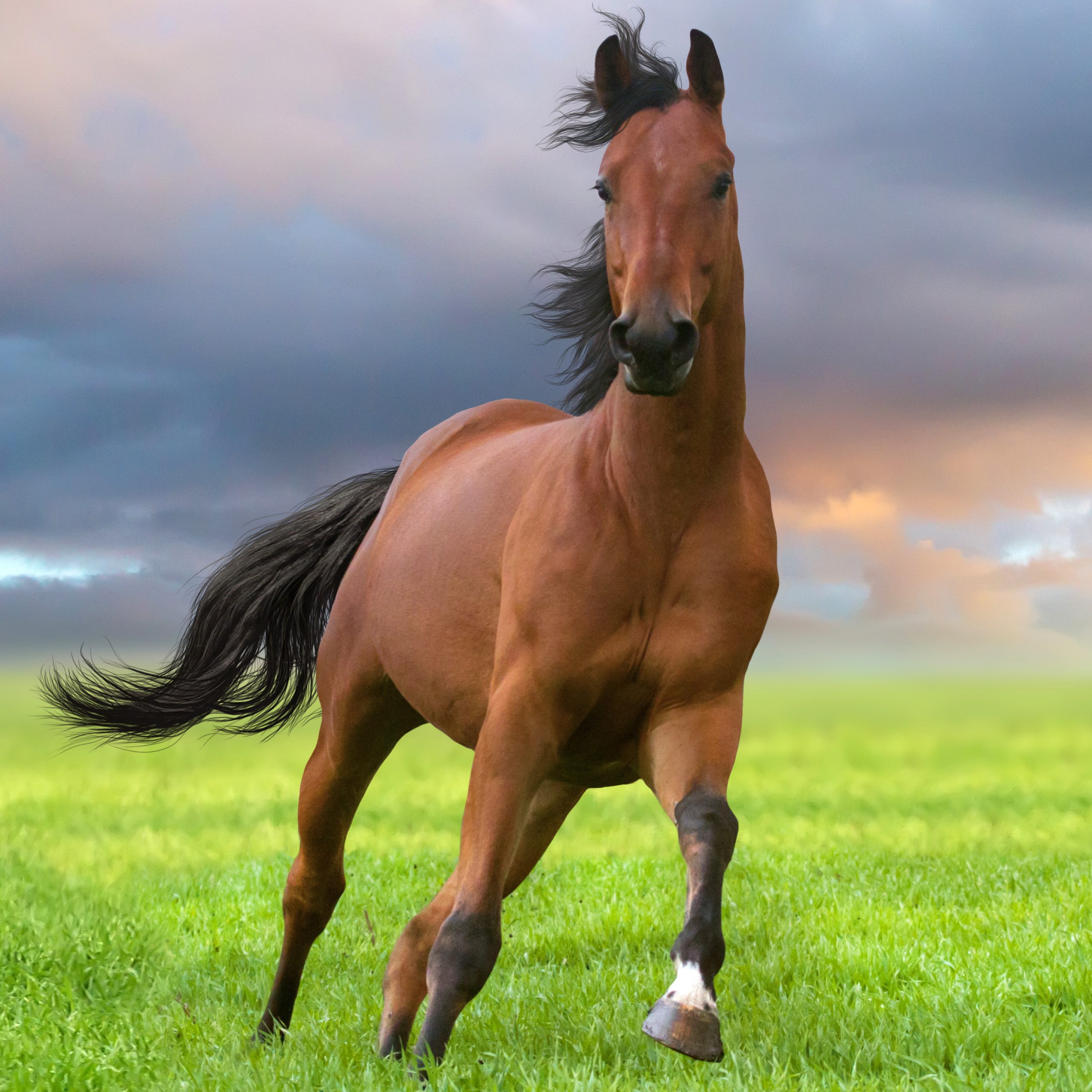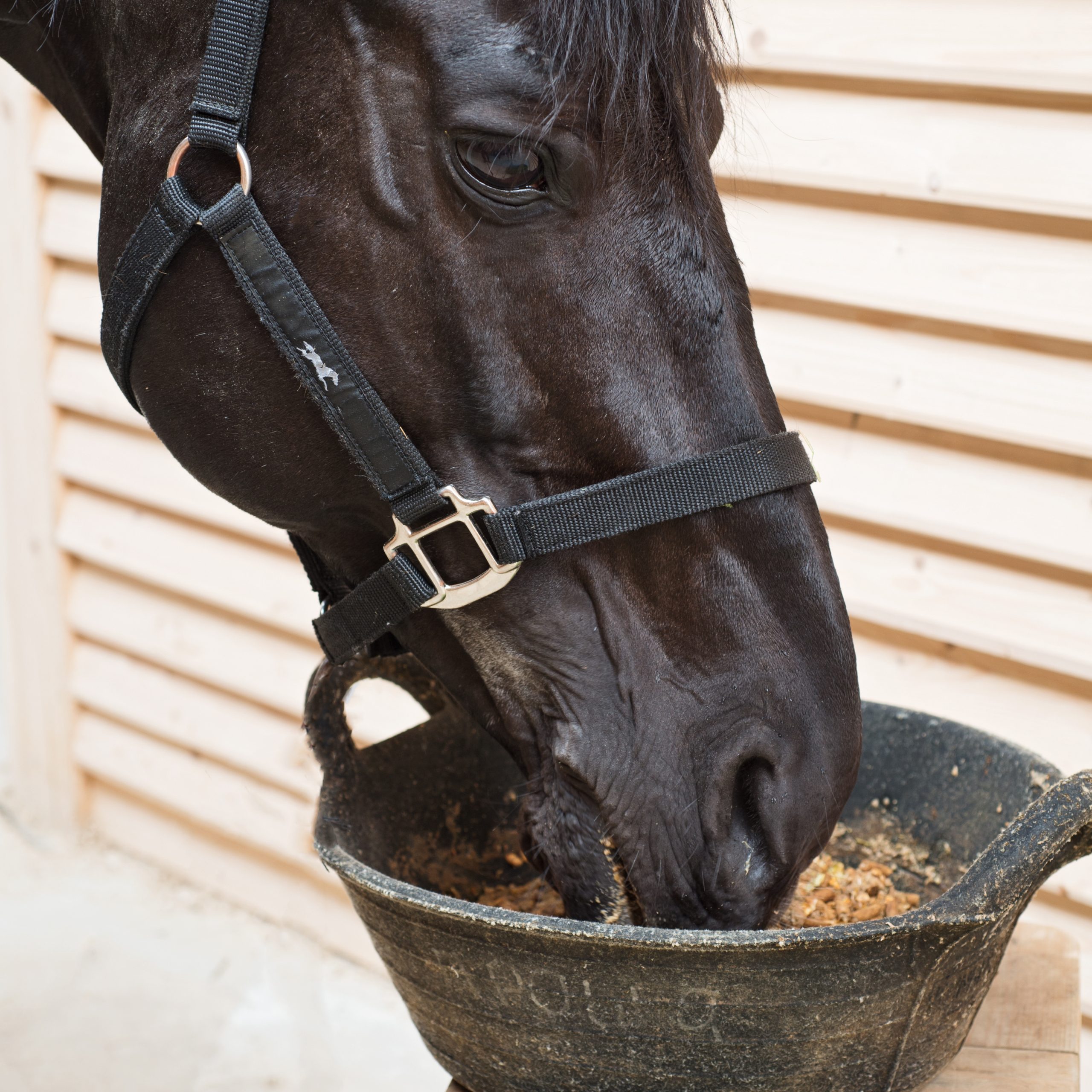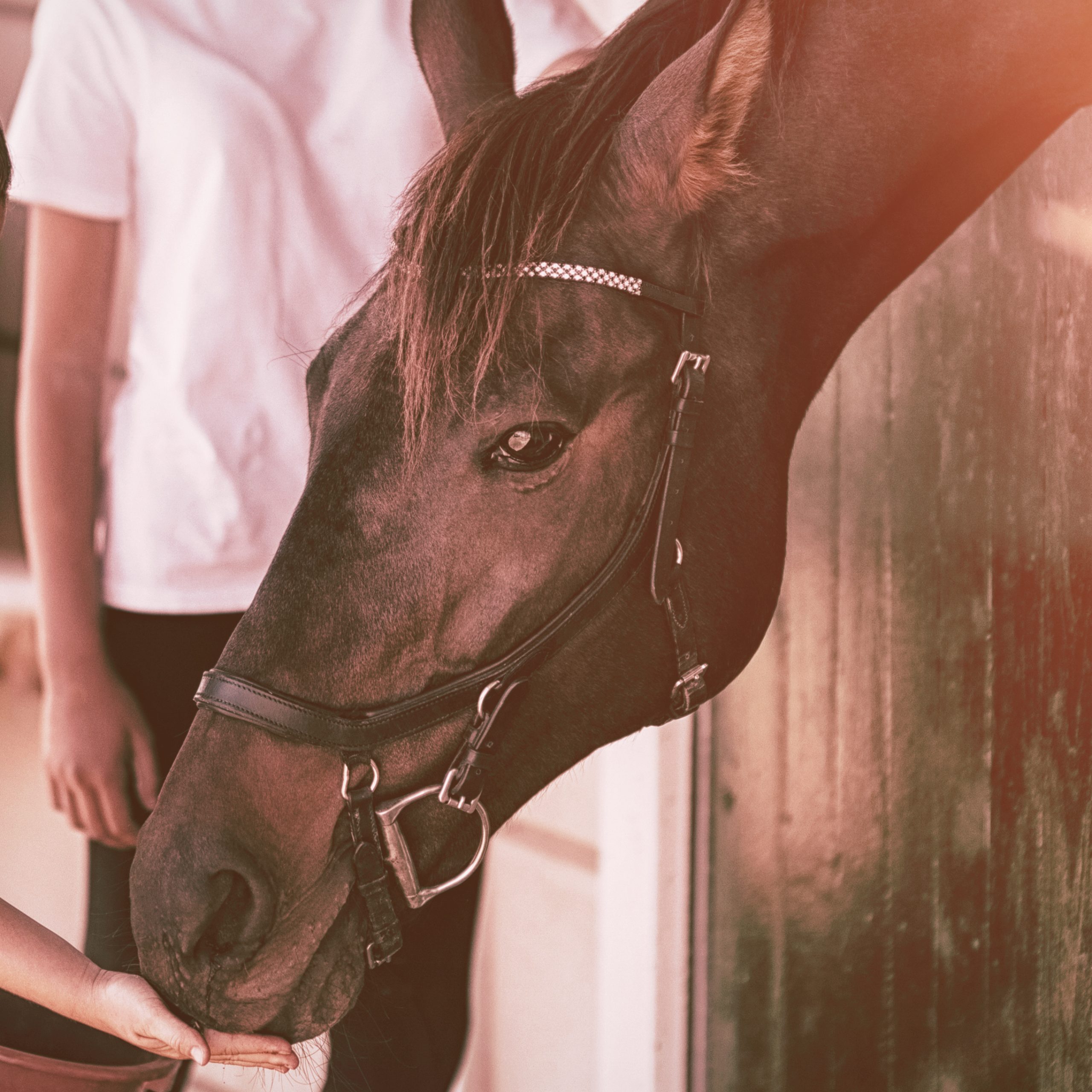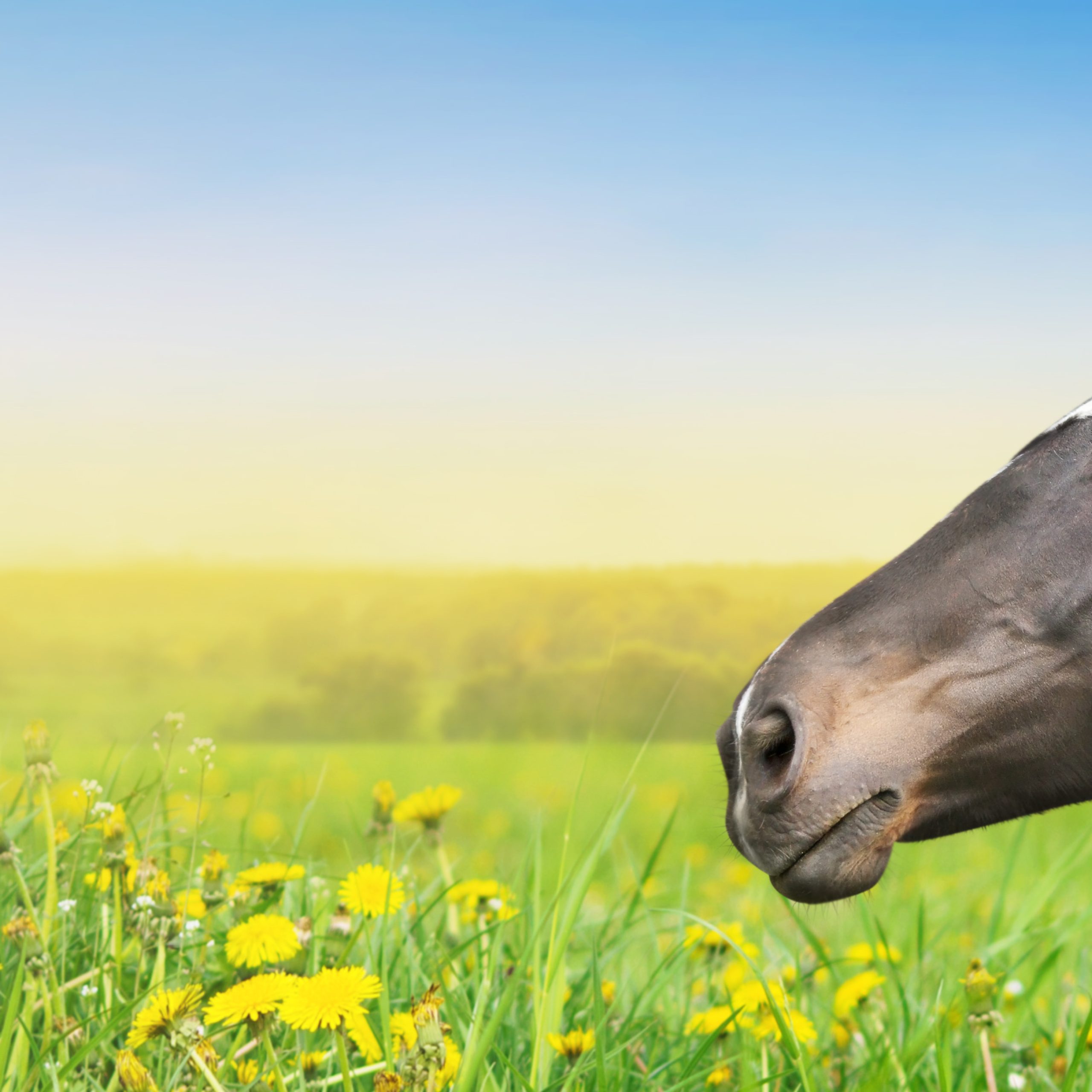Feeding, care, stable cleaning, pasture management – a comprehensive, organic concept for your horse!
A horse of your own – for many people this is the fulfillment of a much longed-for dream. A dream that begins with many considerations: How do I ride, what kind of horse suits me, do I have show ambitions, where do I want to stable it, how much time can I spend, what may the horse itself and then the ongoing maintenance cost, etc.?
A dream that should and can last a long time – up to 40 years. With the MikroVeda microorganism preparations you have a comprehensive, biological concept for the healthy feeding and keeping of your horse at your side.

For health and vitality
Upgrade the feed with ProBiotiX Life (fermented herbal extract) or ProBiotiX Vital (fermented feed grain with fermented herbs)!
When harvesting hay and straw, include MikroVeda Care Horses to prevent mold and reheating.
Clean and care the coat, the sensitive skin and of course the sensitive hoof areas of the horse with MikroVedaCare, so that no dirt and therefore no germs can settle.
Riding equipment and grooming accessories can also be cleaned with Care.
Stables, riding arenas, manure pads can be sprayed with Care at least once a week – less odor, fewer flies, but an environment to feel good in!
Spray Care daily in the stable to bind the dust from the bedding and to deprive possible storage fungi of the basis for their development.
Use active pasture management with MikroVeda Terra to prevent digestive problems caused by fatty feed and hoof rot.
The microbiome balance of your horse is strengthened by a positive bacterial balance in the long term.
Healthy feeding
The horse was originally a steppe animal. It lived on more or less sparse grasslands. Since on the one hand the quality and extent of the pastures and on the other hand the number of hours of exercise have decreased, the administration of additional feed makes sense.
Hay and straw form the basis as so-called “roughage". The hay should still have its green color, smell fresh and be softer or rougher, depending on the age and stress of the horse. Under no circumstances should the hay be moldy – this can often be recognized by a high dust content.
Horses that are exposed to higher stress levels require additional concentrates such as oats, other grains or even high-quality cold-pressed oils.
Tip for higher quality hay
Already during the hay and straw harvest, MikroVeda Care Horses should always be pressed in, because this prevents the formation of mold and a reheating of the crop. For large bales, 1.5 liters of Care are added to the hay or haylage per 300 kilograms. For small bales, the amount is increased to 2 liters of Care per 300 kilograms due to the larger surface area.


Sensitive immune system
Horses are rectal fermenters, which means that most digestion takes place in the intestine, which can be up to 29 meters long. The appendix, which has a capacity of up to 90 liters, and the colon play a special role.
Moldy hay or poorly fermented silage are poison for the horse’s sensitive digestion! In addition, with mold and dust, the respiratory system is also affected – respiratory diseases are among the most common in horses, followed by diseases of the digestive system.
With the specially fermented MikroVeda microorganism preparations you can support here variously and/or counteract illnesses!
Biological supplementary food
A healthy intestinal environment and a strong intestinal mucosa mean an intact and functioning immune system and thus also prevent excessive infestation with intestinal parasites.
With the ProBiotiX products you can positively influence the intestinal environment and thus the digestion of your horse. The special mixture of lactic acid cultures and yeasts forms the basis in these products. They are communitized and fermented so that valuable ingredients can be produced.
The fermentation of the herbs and microorganism strains contained in the ProBiotiX supplements creates vitamins, enzymes, amino acids and antioxidants that can support the animal’s digestion, stimulate appetite and build a stable microbiome balance.


What is ProBiotiX LIFE?
An herbal extract (herbs from certified organic cultivation) fermented with a blend of non-GMO microVeda microorganisms freely found in nature, specially developed for horses. The herbal extract consists of anise*, basil herb*, fennel*, caraway*, oregano*, peppermint*, rosemary leaves*, red clover flowers*, sage leaves*, black cumin seeds*, thyme*, blueberry leaves*, raspberry leaves*, licorice root* and Jerusalem artichoke flour*. (*controlled organic)
What is ProBiotiX Vital?
Feed grains (wheat bran, wheat, barley bran, barley, corn flakes) and herbs from controlled organic cultivation, fermented with coordinated MikroVeda microorganisms, and coral algae lime.


Biological horse care MikroVeda Care
Care, cleaning and pasture management – the natural horse care!
The product from the fermented MikroVeda microorganism complex supports you to strengthen the health and vitality of your horse.
and vitality of your horse and to provide a healthy environment.
Supplementary feeding
ProBiotiX Life (fermented herbal extract) or ProBiotiX Vital (fermented feed grain with fermented herbs) are added to dry feed.
Both can be fed to all breeds of horses, especially to horses
- with loss of vitality,
- which are heavy-fed
- with age-related feeding problems as well as
- in stress situations,
- during tournaments and transports,
- in the recovery period,
- after worming,
- for intestinal rehabilitation,
- as a useful feed supplement.

Advantages
A healthy and balanced microbiome balance
- improves the vitality and stability of the horse,
- regulates the intestinal flora and thus keeps the metabolism going (among other things, harmonious course of the coat change, shiny coat),
- stabilizes the immune system
- supports the horse’s performance
- improves feed quality and feed conversion,
- improves appetite,
- makes urine and feces odor inconspicuous and
- decomposes horse manure more quickly into valuable compost.
Horse Care
MikroVeda Care Horses is used for cleaning and care of the horse’s coat, skin and hooves, as well as stables, runs, riding equipment, etc.
Cleaning is especially important where dirt and harmful germs settle in skin folds and on hooves and can lead to inflammation. Washes (1:10) with Care or a targeted spray are effective here. Ideal for use in the mane ridge area, on the tail rump or, if necessary, more extensively on the whole body.
Conscientious hoof care is particularly important. The hooves must be kept healthy and efficient. Hoof care should therefore be given special attention from an early age.
Hooves should be cleaned with Care at least every other day, especially when the horse is stabled, and the sole and frog should be freed from manure and slurry. In case of grazing, this cleaning is sufficient once a month. After the hooves have been cleaned with a hoof scraper and a strong water brush, Care is sprayed on the hooves diluted with water in a ratio of 1:1 or the hooves are bathed in this solution.

The stable environment must be right!
Germs such as staphylococci, streptococci or coliform bacteria occur naturally in every stable – unfortunately, they are also often the cause of infections. It becomes dangerous when such germs can multiply uncontrollably in the stable. A very small injury is enough to cause an infection.
Such germs cannot be completely eliminated. Even after the use of disinfectants, new infections can occur again and again because the pathogens have become resistant to chemicals and in a germ-free environment the horses cannot build up defenses.
The natural way to a healthy stable climate and vital animals is the colonization of these environments by regenerative-building microorganism cultures such as those fermented in MikroVeda Care Horses: the MikroVeda microorganisms.
They form a good microbial flora, which ensures that putrefactive pathogens do not multiply en masse and cause the well-known, manifold problems. Without rotting processes, every stable also smells better. The horses can breathe properly again.

How does Care Horses work?
It is a natural product with coordinated microveda microorganisms as well as special herbs. This fermented mixture of probiotic microorganisms and other organic cultures, specially formulated for horse and stable care, has a restorative and regenerative effect on the horse’s microbiome.
Examples of use
Care Horses, nebulized or sprayed in the stable, has a very positive effect on the general condition and vitality of horses. When Care is applied, the microbial environment is positively influenced. It suppresses harmful microbes as well as the putrefaction they produce, thus reducing the harmful gases they produce, such as ammonia, methane or hydrogen sulfide.
Stables, riding arenas, manure pads, etc. maintained with Care do not stink. The air is significantly improved and insect and fly infestation is reduced.
Spray a 10% Care solution over each new bedding (1 liter of Care to 10 liters of water). When doing this, make sure the moisture is still comfortable for your horses.
Fungal odors in the floor of the riding and storage arenas disappear, and the quality of the manure is improved.
Running and lying areas, limiting wall parts, watering troughs, troughs, leather, textiles, grooming equipment, but also coat, mane, tails, hooves etc. can be cleaned and cared for in a natural way by thorough spraying or washing off at least once a week.
Care deprives dangerous storage fungi in hay, straw and grain the bases of development. The large nostrils of the horses breathe in many dust particles during feed intake, which are deposited on the respiratory organs. If large amounts of fungal spores from mold nests in the hay or silage are added to this, it can lead to serious illnesses. For this reason, it is important to bind the fine dust in the stables. Therefore, spray Care into the air daily.
If stalls and runs are regularly sprayed with Care, less dust is produced. Ammonia vapors are bound by beneficial microorganisms. If Care is sprayed into the air daily, the animals literally breathe a sigh of relief.
Optimal pasture management
In spring, horses and owners are already longing for the exuberant romp in the green pasture again. Pasture and hay are the horse’s natural basic food. In addition, staying on a dry, not too oily and not too acidic, organically managed pasture is the healthiest and most economical horse management!
Difficulties
In order for pastures to be used as quickly as possible in the spring, artificial fertilizer is often used. Due to the artificial fertilizer, the greenery on the pasture grows much faster than naturally, but its nutrient composition is not ideal. Such grass promotes digestive problems, which in turn lead to a reduction in the immune system. In addition, frog rot is further promoted by hoof contact with the fertilized soil.
Compaction and deeper browsing by horses very quickly rearrange the plant communities of a sward. In addition, pastures are often used as exercise areas for horses even during non-vegetation periods and during prolonged wet periods. This quickly turns a good, diverse sward into a buttercup site. Ranunculus is toxic to horses.
Also watch for other plants that are toxic to horses, such as autumn crocus or ragwort, as well as excessive concentrations of stinging nettles, thistles, or great dock.
Another problem of the one-sided grazing of grassland by horses is the progressive worming of the horse population. Ongoing collection of horse droppings from the pasture provides some relief.
Overgrazed pastures pose other risks – grazing on grass that is too short can lead to colic, and short grass often contains significant amounts of fructans. Fructans are carbohydrates formed when the energy in the plant produced by photosynthesis cannot be used to grow the grass. Fructans, or grasses in general that are too rich in carbohydrates, promote the development of metabolic disorders and favor laminitis, for example.
Organic pastures
It is ideal to practice an active biological pasture management with MikroVeda microorganism preparations:
On the one hand, stimulate “soil digestion," i.e., soil organisms, by regularly applying the organic soil activator MikroVeda Terra.
Spread organic material such as horse manure already treated with Care in the stable or horse apples collected from the pasture and also fermented with Care.
In addition, a pasture grass seed mix should be sown to maintain the desired grass and herbage composition.
In this way you get again biological, resistant pastures, whose grass and herbage composition is optimal for the digestion and the immune system of the horses!



